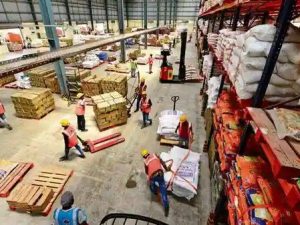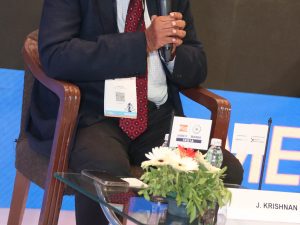Deepak Tiwari, COO, KSH Logistics says, “In 2023, we need the government to address some crucial issues like rising rental prices, fuel prices, and infrastructure costs which has significantly increased the operational cost for any logistics company. There should be an incentive-based system where people building warehouses are rewarded, and the tenant gets the place at a much cheaper rate/sq. ft. The government should also consider investing heavily in automation and incentivizing warehouses that integrate these technologies. On the banking front, interest rates are very high. The interest rate on Capex investment must be decreased. Logistics is a manpower-intensive industry, and while the Skill Council is trying to upgrade the skillsets of human resources, we also need training institutes to train them in the latest technologies and promote R&D and innovation. We also need to bring diversity in the workforce and create equal opportunities for women and 3rd gender individuals. Lastly, with all the infrastructure development that the government is doing in tier 2 and tier 3 cities, if that gets expedited, then we get a better landscape to work. Today the metros are saturated. It’s time to focus and build the rest of India.”
Read More »Budget should focus on reducing logistics costs
Dhruv Agrawal, COO and Co-founder, Shipsy also shares his expectations from the upcoming budget 2023-2024 and says NLP will benefit the sector greatly. “The logistics and supply chain industry has long been challenged by the sector’s highly fragmented nature, multiple regulatory bodies, manual approval processes, poor shipment visibility, lack of stakeholder collaboration, growing cost leakages, rising logistics costs, and evolving customer expectations. The national logistics policy has been a significant step forward in mobilizing the power of digital transformation, particularly in providing platform to break down logistics silos. The upcoming budget would most likely move it forward by strengthening its foundation for its seamless implementation and reducing logistics costs. Besides, there is an urgent need to address climate change concerns through regulations. It would be excellent if the government allocates funds to develop policies that ensure sustainable logistics practices through digitization. The last-mile emissions per delivery in India are 285g CO2, higher than the global average of 204g CO2. Businesses can gradually reduce their carbon footprint by digitizing core logistics operations. This can be accomplished by shrinking the miles travelled per package and ensuring that the distance is covered using greener delivery modes. The thrust to expedite the development of multi-modal logistics parks will also be welcomed by the logistics industry, as it will facilitate lowering logistics costs and carbon emissions significantly. Emphasis on closing the digital skill gap in the logistics sector will also be beneficial.”
Read More »Budget must focus on infrastructure development
Vineet Agarwal, MD, TCI asserts, “We expect the forthcoming budget to provide a balance between the economic growth priorities and inflation concerns, in an all-encompassing manner. The momentum of growth which India has come up with post the pandemic cannot be weakened. We believe that the budget 2022 will be very carefully structured to sustain the growth momentum and continued infrastructure development, irrespective of the ups and downs. As the government’s vision to ease supply chain bottlenecks is quite evident in the scale of decisions and initiatives which have been undertaken in the recent past. The continued focus on the execution of specific strategies will improve global competitiveness. Reducing logistics costs and creating a technology-enabled structure will help to achieve the target of positioning India among the top 25 countries in the Logistics Performance Index. In addition, emphasis on upskilling programs like Gati Shakti Vishwavidalya will help the logistics sector contribute its best in India leading the Industrial Revolution 4.0 & 5G era.”
Read More »Port Qasim gets new MMLP to enhance global cargo ops
A.P. Moller – Maersk, the integrated logistics company inaugurated its new Integrated Logistics Park at Port Qasim in Pakistan. Maersk Pakistan took the bold decision to invest in an Integrated Logistics Park that would act as a warehouse, including a consolidation & fulfilment centre and cold storage, at Port Qasim. Maersk Pakistan went on from acquiring a 26-acre land parcel to carefully designing and constructing a six-shed facility spread over 560,000 sqft that will answer all the requirements of its customers through a single location. “Despite the various current challenges, Maersk has played an important role as a trusted partner for Pakistan’s traders. Maersk’s commitment to invest in a large facility such as the one inaugurated today in Port Qasim speaks volumes of the potential that is out there to be harnessed,” said an official release.
Read More »WOLP Fund 1 commits Rs 500 crore warehousing AIF
Welspun One Logistics Parks (WOLP) has committed 100 per cent of its Rs 500 crore corpus across six investments to create a portfolio of Rs 2,300 crore spanning five cities–MMR, NCR, Bengaluru, Chennai, and Lucknow– aggregating to about 6.6 million square feet of gross leasable area. Last year, the firm raised India’s first alternative investment fund (AIF) focusing on warehousing development. Of the 6.6 million sq. ft, one million sq. ft of area has been delivered and an additional two million sq. ft is expected to be delivered in the second quarter of calendar year 2023, the company said in a statement. Fifty per cent of the firm’s funds’ portfolio will be delivered, operational and rent generating in a little over two years from its first close, the statement added. Notably, about 60 per cent of the portfolio is already pre-leased to a blue-chip roster of tenants such as Delhivery, Flipkart, FM Logistics, Tata Croma, and Ecom Express, with significant scope for leasing of the balance portfolio.
Read More »MoU signed to boost efficiency, transparency in agri trade
DCX – a global Agri Fintech operator of platforms for Agri products and Shree Shubham Logistics Limited (SSL) have signed an agreement to bring transparent, efficient, and robust agri-commodities trading to India. SSL’s best-in-class warehousing service with over 1 million m2 of facilities across 6 states will now be available to all DCX clients as part of its secure and trusted negotiation, contracting and execution solution, said an official release. The DCX platform integrates with a variety of service providers – inspection, freight, insurance, and finance. This is now the first time that warehousing will also be available directly on DCX providing full visibility for all stakeholders on the status of the trade, and the condition of collateral. The SSL solution reduces post-harvest losses and increases food security, using scientific and efficient warehouse management systems through our own state-of-the-art Agri-Logistics Parks (ALPs) as well as in third-party warehouses. Our wide spectrum of services ranges from Storage and Preservation, Collateral Management, and testing of Agri commodities.
Read More »‘NLP to enhance logistics efficiency, EODB, trim logistics cost’
The National Logistics Policy (NLP) launched recently by Prime Minister Narendra Modi will help India propel itself into a top manufacturing and sourcing country globally. Acknowledging the same, Manu Raj Bhalla, President, the Warehousing Association of India (WAI) said, “The policy encompasses all aspects of the supply chain such as transportation infrastructure and technology to provide cost-effective, sustainable, and robust multimodal solutions with real-time visibility to industry stakeholders. The policy will complement the PM Gati Shakti National Masterplan, will facilitate investment in warehousing and logistics infrastructure, dovetailing into Make in India alongside the Aatmanirbhar Bharat initiative.” He added, “The vision is to develop a technologically enabled, cost-efficient, resilient, sustainable, and trusted logistics ecosystem for accelerated and inclusive growth. The policy includes a detailed action plan to achieve a reduction in logistics costs in India, to be in the top 25 countries in the Logistics Performance Index ranking by 2030, and to create a data-driven decision support mechanism for an efficient logistics network. Several initiatives under the policy, including the Unified Logistics Interface Platform (ULIP), the Ease of Logistics Services platform, an e-handbook on Warehousing, training courses on PM Gati Shakti Masterplan, and logistics on i-Got, were launched along with the NLP. All these initiatives will help facilitate the digital transformation of the Indian logistics and supply chain ecosystem, thus enabling integration with the global value chains in an efficient and cost-effective manner,” said Bhalla.” Agreeing with Bhalla, Arif A Siddiqui, Vice President WAI said, “To develop a technologically enabled, integrated, cost-efficient, resilient, sustainable, and trusted logistics ecosystem in the country for accelerated and inclusive growth. This vision will be achieved by Integrating the modes of transport, Optimization of the utilization of logistics infrastructure, Standardization of processes and service quality, Modernization of …
Read More »High freight cost speed breaker for logistics growth, EODB
J Krishnan, Board of Advisors, ACAAI talked about the core issues prevailing in this sector, he said, “The recent withdrawal of the exemption of international export freight is a very serious speed breaker and is not in consonance with the accelerated impetus to bring down the total logistics cost in India. This exemption or even more effective a’ zero rate’ regime for international freight must be assured. Skilling for the Logistics centre especially a syllabus in the vernacular needs a close monitoring and implementation if we are to provide the requisite efficient manpower for this industry.”
Read More »Gender Diversity in Logistics: Need of the hour
The second day of the ongoing 46th annual convention of ACAAI concluded with a panel discussion featuring Women in the Logistics sector. The panelists included Sakshi Gupta, Pacific Air Log, Latha Prakash, Broekman Log, Kavita Iyer, Aahana Solutions, Phoram Sampat, EKF Global, Reena Plakal, Aerosail Services, and Anupama Kachhap, WFS, while the Session Chairperson was Chaitaly Mehta, Member, Managing Committee, ACAAI. The ladies who are experts in their professions not only shared their stories and experiences of surviving the pandemic while balancing home and work but also urged the industry stakeholders to give more chances and opportunities to women professionals. “Gender diversity in logistics is the need of the hour. Logistics is no more a Man’s world. We need equal opportunities as there’s nothing we can’t do,” they stressed. Women are playing crucial roles in the industry by undertaking various initiatives to foster growth and create sustainable environment while being at the helm. Women participation at the ACAAI convention is quite visible and laudable.
Read More »E-bill of Lading is the future of Logistics: Shankar Shinde
FIATA Paperless bill of lading was launched by the FFFAI in India recently to integrate all modes of transportation, enhance efficiency and provide seamless and uninterrupted digitized supply chain solutions to the customers. Shankar Shinde, Chairman, FFFAI, while speaking at the ongoing ACAAI convention said, “Digitalization and Paperless transactions are the future of the business. Government of India has shown interest and is supportive to activate eBL to ensure active supply chain at any stage and with the support of the government aggressively working towards looking into regulation (Banking and electronic documentation)to align for implementation and acceptance across the stakeholders and Government Agencies on Legal grounds which is expected shortly. We have already experienced the success of eBL execution in some of the countries and shortly there will be are confident that there will be high acceptance and adoption at all levels. One should look forward to be first to onboard to grab the opportunity.” This will also reduce fraud with transparency on real time basis visibility as there would be no physical movement of documents and systems will based on messages exchange with traceability and delivery to right title holder discharging /defacing online through systems, he added. Shinde further added that in a market like India, having own bill of lading is a challenge as presently the logistics sector has to be registered to issue MTO Bill of lading for which more than one mode of transport in addition to sea would be required. “The first step towards this would be to empower the logistics service providers in capacity of issuing the Bill of lading as carrier and take the ownership which comes with responsibility to build trade confidence, …
Read More » Cargo Breaking News
Cargo Breaking News









